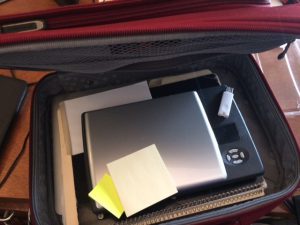 Shortly after I began work at NEHGS about ten years ago, we went into all-hands-on-deck mode. The occasion was the National Genealogical Society’s annual conference, which was in Boston that year and bringing many visitors to the building. A newbie, I was assigned the non-genealogical task of welcoming people at the door. The first person arrived, pulling a wheelie bag behind her. “Hello!” I said. “May I store your bag?” Everyone froze. A hushed silence fell. Finally someone clued me in: “Penny. That’s her research!” Oh.
Shortly after I began work at NEHGS about ten years ago, we went into all-hands-on-deck mode. The occasion was the National Genealogical Society’s annual conference, which was in Boston that year and bringing many visitors to the building. A newbie, I was assigned the non-genealogical task of welcoming people at the door. The first person arrived, pulling a wheelie bag behind her. “Hello!” I said. “May I store your bag?” Everyone froze. A hushed silence fell. Finally someone clued me in: “Penny. That’s her research!” Oh.
 Now I have a wheelie bag of my own. Actually, mine is not wheeled but has a wide shoulder strap. Now that I am semi-retired, I have had time to refine the list of items I carry in the bag for a day of research. Beyond my laptop and power cord, they include the following:
Now I have a wheelie bag of my own. Actually, mine is not wheeled but has a wide shoulder strap. Now that I am semi-retired, I have had time to refine the list of items I carry in the bag for a day of research. Beyond my laptop and power cord, they include the following:
- Pencil with eraser. Ideally, this will be a no. 2 pencil, and a mechanical one, as I am fussy about pencil sharpness. Not only do most libraries prefer for you to use pencils rather than pens, but pencil writing is easy to erase if I make a mistake.
- Thumb drive, for sharing files or downloading a document or image from another source.
- Even though I take notes on my laptop, the physical act of writing with a pencil often helps me remember things. I prefer a spiral-bound notebook and paper with perforated pages so that I can remove pages and put them in a relevant file folder. I also like notebooks with pockets, where I can keep relevant loose pages that come my way.
- Small note pad, for keeping a running to-do list separate from my research notebook. Sheets from this pad also serve as temporary bookmarks.
- Post-It notes of various sizes, for flagging pages within my own research files.
- File folders. I bring (limited) files of work in process, but also a blank folder for new topics undertaken or people discovered.
- Blank family group sheets and multigenerational charts.
- Cell phone and/or scanner. Often I use my phone to take a photo of a page or pages during research. I do own a portable scanner, a Flip-Pal, which I sometimes pack if I want to scan images.
In addition, I’ve developed other habits for research days:
- Wear layers. If the library is overly air conditioned, I wear a sweater. If it’s too hot, I remove the sweater.
- Wear dark clothing. I am known to wear the food I am eating and also the ink or pencil I am writing with. Dark clothing hides stray pencil marks.
- Bring small bills and change to pay for photocopies, as necessary—or to raid the snack machine!
As I write this, I’m thinking of the last time I took my bag to NEHGS.
It was kind of heavy.
Maybe I need one with wheels.
Great ideas! I simply cannot live without the spiral-bound notebooks with the perforated pages. The ones with the internal pockets are the best to toss in loose papers if needed.
Aren’t they the best?
I don’t carry a laptop; for me, that would only be a distraction. Instead, I narrow my focus on particular research goals by writing them out, and bringing the relevant printed family group sheets and family pedigree chart for the branch I’m researching. I print out the family pedigree on ledger-size paper, so there’s room for plenty of notes.
When I’m traveling outside my local area, I also print agendas and maps so I make sure to cover everything I set out to do.
Love the idea of bringing agendas and maps.
I enjoyed your writing and have a very similar list. However, I also bring small slips of paper pre-cut and placed in a small zip lock to use as page markers. Several research facilities that I have visited will not allow the use of post it notes.
Good advice–thanks!
I would just add a flat bookmark style magnifying glass — just to be sure you really want to spend the time on that page!
I love this idea and will have to find one of those.
Thank you for the reminders. Nothing is more annoying than realizing you don’t have your charger with you when the battery in your phone or tablet is running low.
It’s the worst.
Perfect timing of your article! I am traveling to NEHGS tomorrow with Cape Cod Genealogical Society for a day of research
Hope you had a good day of research!
I love how you cover all of the essentials. My laptop bag used to have all of these items, until I moved away from home (Massachusetts) halfway around the world, and no longer had a place to physically go to do my research.
Still, I should prepare my laptop bag anyway, because I’ve found surprising opportunities to do research, even though I’m not back home!
I always take my Blaverhasset with me (oops! my iPad, which I named Blaverhasset after the most intriguing name I discovered in my family tree, apparently Old English for a house on the sheltered side of a hill). With the iPad, I can access my tree on Ancestry.com, access the NEHGS website, take pictures, scan documents, take notes, etc. Much lighter and more versatile than my laptop. I always bring my charger, just in case!
I’m glad to see that you let people come into NEHGS to research with what they feel is necessary to research. It is disappointing for me to travel two or three thousand miles and not be able to take in my briefcase. Then spend time going back and forth to a locker. Or worse yet, have to leave it in the car.
Penny, What a great article. I have a question about publishing a family history book. Is there a way I can contact you via email to ask you a question or two?